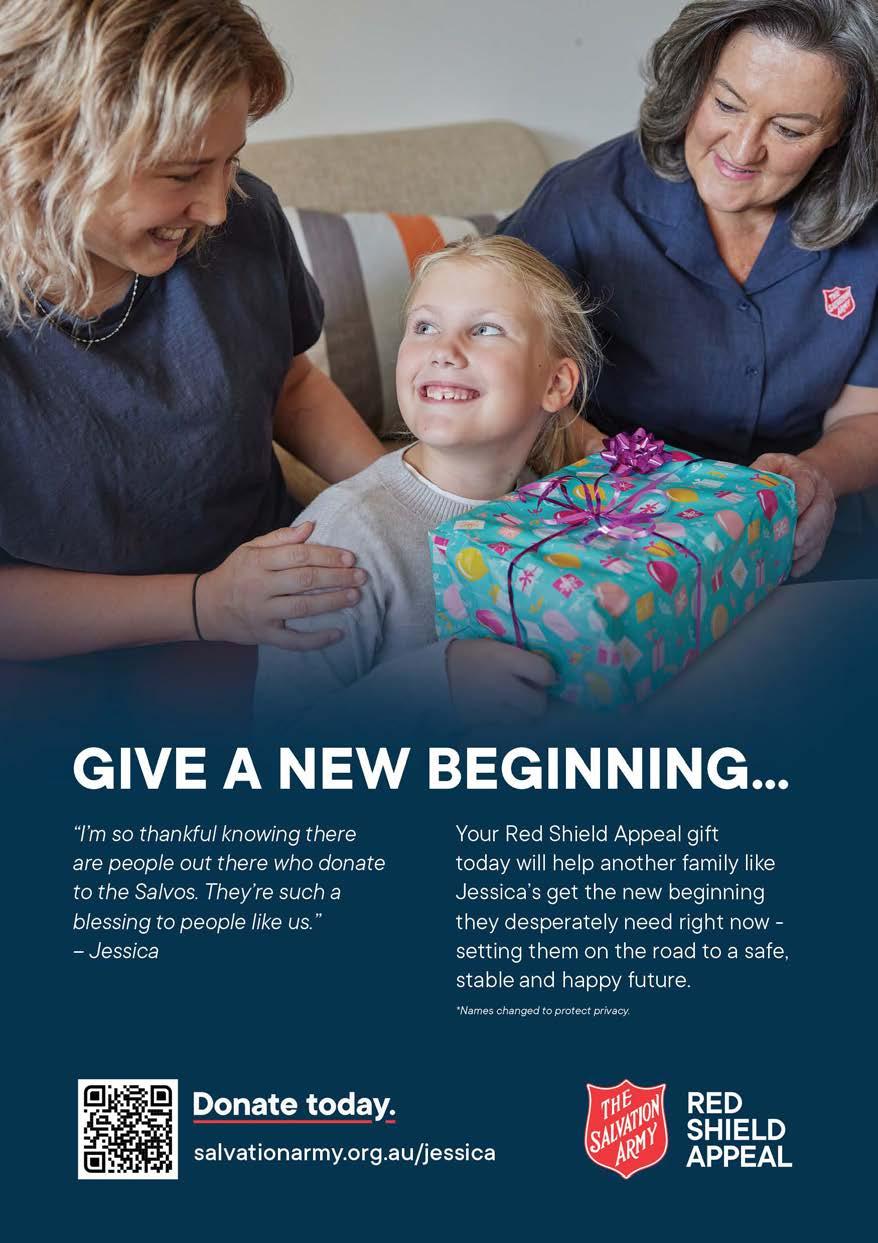MY STORY A heritage of hope FEATURE 5 minutes of social justice FAITH TALK The shape of things to come Vol. 005 | No. 15 4 May 2024 AUD $1.00 PRINT POST APPROVED PP100001474 salvosonline.org.au Living as people of peace Breaking the cycle of hatred and violence
Happy Mother’s Day! Sunday 12 May 2024
The Salvation Army is about giving hope where it’s needed most.
What is The Salvation Army?
The Salvation Army, an international movement, is an evangelical part of the universal Christian Church.
Vision Statement
Wherever there is hardship or injustice, Salvos will live, love and fight alongside others to transform Australia one life at a time with the love of Jesus.
Mission Statement
The Salvation Army is a Christian movement dedicated to sharing the love of Jesus by:
• Caring for people
• Creating faith pathways
• Building healthy communities
• Working for justice

The Salvation Army Australia acknowledges the Traditional Owners of the land on which we meet and work and pay our respect to Elders, past, present, and future. We value and include people of all cultures, languages, abilities, sexual orientations, gender identities, gender expressions, and intersex status. We are committed to providing programs that are fully inclusive. We are committed to the safety and well-being of people of all ages, particularly children.
Salvos Magazine
Founders William and Catherine Booth
Salvation Army World Leaders
General Lyndon and Commissioner Bronwyn Buckingham
Territorial Leader Commissioner Miriam Gluyas
Secretary for Communications and Editor-In-Chief
Colonel Rodney Walters
Publications Manager Cheryl Tinker
Editor Simone Worthing
Graphic Designer Ryan Harrison
Enquiry email publications@salvationarmy.org.au
All other Salvation Army enquiries 13 72 58
Press date 19 April 2024
Printed and published for The Salvation Army by Commissioner Miriam Gluyas at Focus Print Group, South Granville, NSW, Darug Nation lands.



Reflection and response
Our world is far from peaceful. Our nation, communities and, too often, our lives, are impacted by violence, conflict and anger.
Despite the daily onslaught of disturbing news, there are many good things happening globally as well – incredible sacrificing for others, acts of courage and kindness, deep compassion and unconditional love.
In this edition, Jo-anne Brown looks at how we can live more peacefully and break the cycle of hatred and violence – in our own personal lives and beyond.
As Mother’s Day approaches, The Salvation Army Moneycare team shares some gift ideas for our mums that won’t break our tight budgets.
The Salvos Magazine team would like to wish all mums a very happy Mother’s Day. For many though, the day is not a happy one. Being a mother can be challenging. Some women can’t become mums. Some don’t have a living mother. Others associate pain and trauma with their mums or motherhood. Hopefully we can all be kind, and supportive to those struggling during this time, even as we celebrate.
Simone Worthing Editor salvosonline.org.au
My Story [12] A hertiage of hope News [9] Salvos impact Poverty Report Feature [4] Living as people of peace
CONTENTS 3 4 M Ay 2024
Living as people of peace
Breaking the cycle of hatred and violence
By Jo-anne Brown
It was a rather gloomy day in a country far away from here and we were in a very large supermarket, looking at shelves of grocery items with labels in a language we didn’t quite understand. I can’t even remember what I was looking for, just some basic ingredient I used all the time and should have been easily able to locate.

My husband accidentally brushed against me, and I turned on him ferociously: “Stop pushing me around!”
I was shocked by this eruption of anger at such a minor event. On reflection, I realised my anger had nothing at all to do with my husband bumping into me and everything to do with how I felt trying to settle into an unfamiliar country, learn a foreign language, and deal with a whole lot of things (including the
weather) that I had never experienced before. All the frustration and feelings of inadequacy had been building up inside me without me having any real awareness of them. Without this awareness, I overreacted to the next little bump (literally) that came along.
UNRECOGNISED STRESS AND FRUSTRATION
We are often impacted by unrecognised stress and frustration that erupts or oozes out when we least expect it, impacting the people who least deserve it. Perhaps most of us have been surprised when we (or someone else) reacted intensely to something that seemed relatively insignificant. “Where did that come from?” we ask.

We are often impacted by unrecognised stress and frustration that erupts or oozes out when we least expect it.
This kind of overreaction is a good pointer to what’s happening inside us. When we pause and think about it, we become more aware of the inner tensions or anxieties we’ve been holding but trying to ignore – the unseen issues that drive our reactions and cause us to behave in ways that are hurtful or
FEATURE
unkind to others. We can then choose what to do with this.
There is so much going on in the world around us we can’t control and that can cause intense anxiety. We only have to watch the news to know this. Reaction to these political, environmental and economic events is often aggressive and violent. The violence may not necessarily be physical but might be in how we speak or respond in other non-verbal ways to others.
THE ROLE OF OUR NERVE CELLS
I’ve recently read about mirror neurons – nerve cells that trigger the same impulses in the brain while watching a process that would occur if the process was actively performed by ourselves. In other words, when we see violent or aggressive behaviour, the neurons in our brains trigger a similar response in us! Perhaps you’ve noticed it in yourself. Seeing bullying or aggressive behaviour on the news seems to arouse agitation within ourselves. We might respond
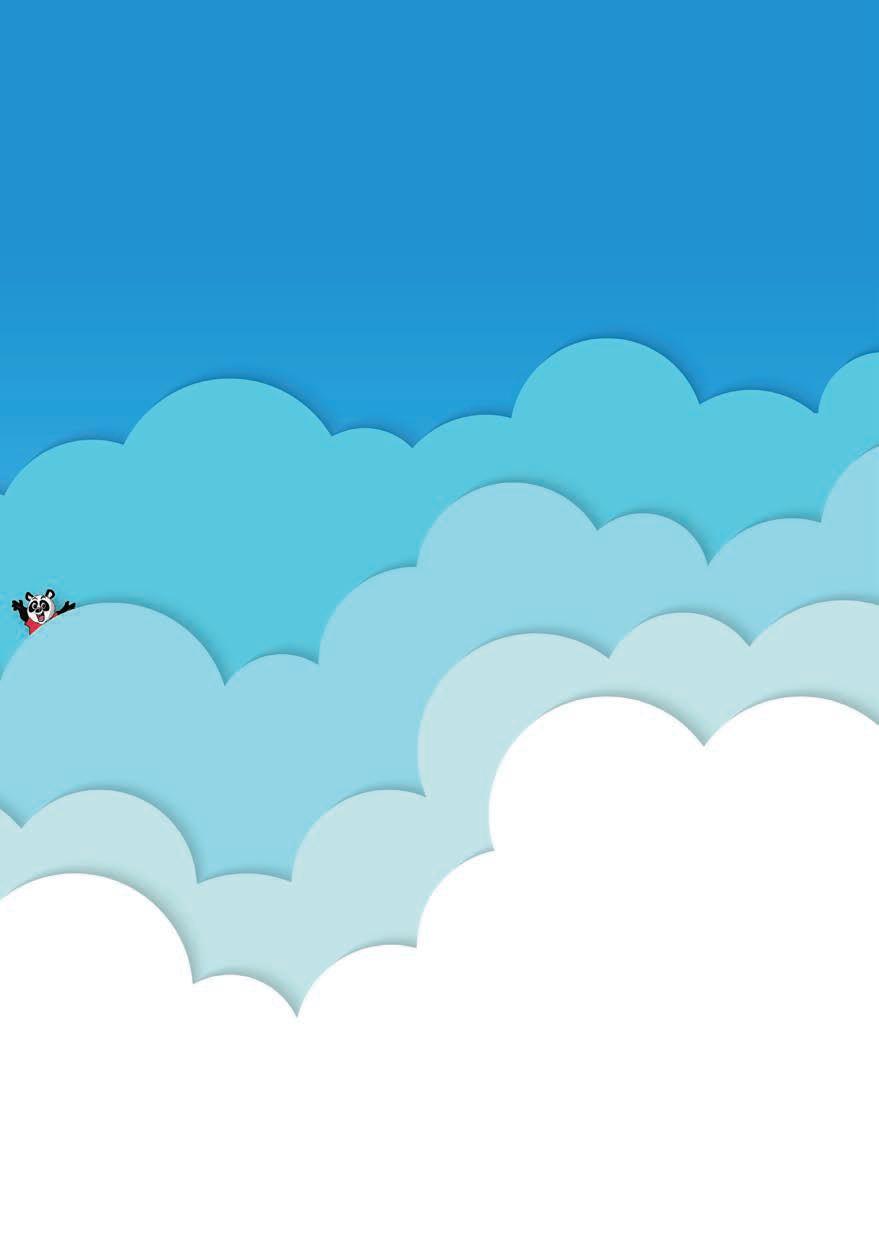
loudly or angrily to what we’ve seen or snap at the person sitting next to us, even though they’ve done nothing to cause that reaction.
Similarly, being exposed to kind, considerate acts can trigger that same response within us – we’re influenced by the calming, compassionate presence of others. It’s not always possible to live in calm, peaceful environments. In fact, many people face violence and danger on a regular basis. We can’t rely on outward circumstances to offer us calm and peaceful lives. We need to look elsewhere.
FINDING INNER PEACE
Throughout history, wise teachers have pointed the way inward as a means of finding peace and becoming people of peace. Wisdom traditions teach us to look within ourselves, to draw on deeper resources, to find peace. We can’t always change our external circumstances, but we can work on how we respond to them – making it possible to influence that environment.

FEATURE
4 M Ay 2024

When we find and nurture peace within ourselves, we can remain quiet and calm, surrendered and safe – inwardly protected from the tumult and turbulence of the world around us. I recently read that “Calm bodies calm other bodies” and I know this to be true. We can break the cycle of hatred and violence. We probably all know people who hold such a deep sense of inner peace that we are automatically calmed by their presence. Science explains this as a function of our nervous system – a calm nervous system can soothe the nervous system of others.
When our nervous system is at rest (not in flight or fight, but in the rest and
digest state), we experience a sense of calm, connectedness, creativity, compassion and curiosity. This is the kind of peace and wellbeing that wise teachers have talked about through the ages.
BRINGING PEACE TO OTHERS
What is happening in my nervous system impacts your nervous system. Think back to the person you know who brings an innate sense of inner peace with them wherever they are. How does it feel to be in their presence?
What you are noticing when you reflect on that experience shows that your nervous system is being positively impacted by theirs. In the same way, when we are calm and at peace, when our nervous system is in a soothed and settled state, we too can impact the state of those around us.

We are created to be people of peace and to bring peace to those around us.
Our physical body, our nervous system, is designed to keep bringing us back to a calm, peaceful state.
We are created to be people of peace and to bring peace to those around us. This is an incredible gift to a world in turmoil.
Scan here for more stories of hope.
FEATURE


Five minutes of social justice –Mental ill-health
Social justice means different things to different people, but it generally includes the idea of a society being fair and equitable.
In Australia, social justice challenges are multifaceted, including issues such as poverty, homelessness, Indigenous rights, and discrimination based on factors like race, gender, disability, and socioeconomic status. Some of the issues in Australia are huge and will take a lot of effort to fix – but all of them can be made better.
As we approach the annual Mental Health Awareness Week this year (13-19 May), this segment of ‘Five minutes of social justice’ looks at the issue of mental health and the difference we can make as an individual, community, state or territory, or as a nation.
Mental health can fluctuate, and many factors can contribute to experiences of mental ill-health including financial stress, homelessness, family and domestic violence, substance use and social isolation. The stigma around mental ill-health can act as a barrier to people accessing help, and can cause those experiencing mental ill-health to withdraw, or hide their illness, even from those they are close to.
Mental ill-health is one of the most pressing public health issues in Australia, with 8.6 million people experiencing a mental disorder at some time in their life – that is two in five Australians aged 16-85 (Australian Bureau of Statistics, 2022).
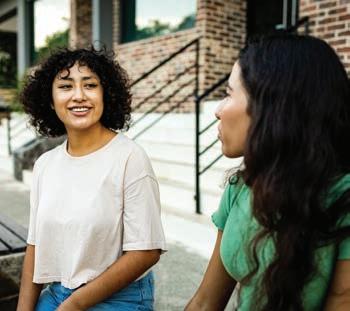
GOT FIVE MINUTES?
• Read an article about mental ill-health on websites such as Beyond Blue or the Black Dog Institute.
WANT TO DIG DEEPER?
• Sign up for a mental-health first aid training course.
• Treat those with mental ill-health and illness with respect and dignity. This could look like authentic friendship, providing a listening ear, and practical support and encouragement.
• Work to change the conversation around mental ill-health. Look into the R U OK Day website, which has multiple suggestions around starting and engaging in conversations about mental ill-health.
Scan here for information and resources on mental health.
FEATURE
4 M Ay 2024 7
A budget-friendly Mother’s Day
Making mums feel special without breaking the bank
For many Australians around the country, budgets are tight and making ends meet is a constant juggle – and struggle.
Presenting our mums with a gift, however ‘small’ this Mother’s Day (Sunday 12 May), is still something many of us would like to do. How can we do this and keep our budgets on track?
CREATIVE NOT COSTLY
Some low-cost gift ideas that show love and appreciation:
• Homemade baking – cupcakes, biscuits or a budget-friendly meal bit.ly/mealstomakeendsmeet
• Curated Mother’s Day packs from your local op-shop
• Handmade cards or vouchers for cleaning, a shoulder massage or movie night at home
• Picnics in the local park
• Breakfast in bed.
For more money management information, check out the Salvos’ free financial capability program, you’re the Boss.
Trained and experienced Moneycare financial counsellors are also available for free-of-charge sessions to help people get their finances back under control.
For more information, call 1800 722 363.
Scan here for more information about The Salvation Army’s Moneycare services.

SALVOS MAGAZINE 8 NEWS
Salvos impact Poverty Report
The Salvation Army’s Policy and Advocacy team made a major submission to the Senate Community Affairs inquiry into the Extent and Nature of Poverty in Australia in 2023, and the final report was released last month.
The Salvation Army was mentioned 81 times across both the interim and final reports.
Five of the 14 recommendations that were agreed to by the committee called for reform or review of aspects of the social security system that The Salvation Army had raised as an issue.
The Committee acknowledged the compelling evidence from Jennifer Kirkaldy, Director of the Policy and Advocacy team, for early-intervention and place-based initiatives to address child poverty, and recommended the Australian Government continue to invest and consider increasing investment. In the final report, the Senate Community Affairs References Committee acknowledged information or recommendations made by The
Salvation Army in relation to at least 16 different subject areas.
SUBMISSION HIGHLIGHTS
The Army’s submission highlighted the impacts of poverty upon individuals, the community and Australia as a whole.
It delved into shelter, safety, health and overall participation as being the overarching categories of poverty. It also examined the ways in which governmental and social structures systemically disadvantage cohorts.
The Salvation Army submitted that these groups – women, Aboriginal and Torres Strait Islander people, CALD (culturally and language diverse) communities, young people, rural and remote communities and people with disability – are not vulnerable but have been failed. – Simone Worthing
To read the Senate Inquiry into the Extent and Nature of Poverty in Australia – Final Report Summary, go to bit.ly/4aylY5b
To download the Final Report, go to apo.org.au/node/325833
9 NEWS
4 M Ay 2024

The shape of things to come
Making worthwhile impressions
By Faye Michelson
Ingredients: 2 cups plain flour, ¾ cup salt, 4 teaspoon cream of tartar, 2 cups lukewarm water, 2 tablespoons of vegetable oil, food colouring.
Method: Sift flour, salt and cream of tartar in a large saucepan. Add the water, oil and food colouring. Cook over medium heat, stirring constantly until the dough thickens and begins to form a ball. Remove from heat and place onto a board. Allow to cool a little, then knead until smooth.
That’s a great playdough recipe. There is something soothing about its silky texture; children love squishing the soft mixture through their hands, rolling and flattening, cutting and pressing shapes into it – and, I must admit, so do I. It’s therapeutic! I’m always happy to sit beside a little person with my own lump of playdough to work on.
IMPRESSIONS
It’s a very responsive medium. Small fingers can turn a slab of playdough into all manner of things – little balls rolled by hand, strips cut by plastic knives, and animal and heart shapes cut out by cookie cutters. One of our favourite accessories is a plastic strip with different motifs. you press it into a flat piece of playdough and there it is – a mirror image of the original. It’s so satisfying to make!
Do you ever feel like your children (or indeed, yourself) are as responsive as that? How we press our attitudes on those around us and, in turn, how we take on the marks and indents of what presses onto us?
Parents, grandparents – anyone who has regular contact with a child makes an impression on them. They experience
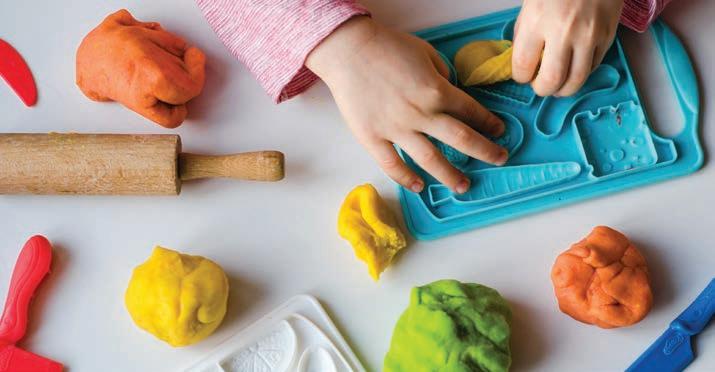
FAITH TALK
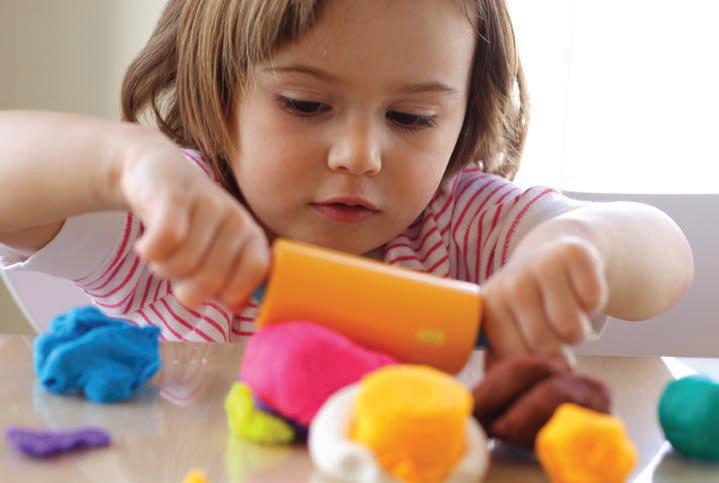
kindness or not, they feel safe or not, and they learn what is important to you, their adults, by what is said to them and what they see happening around them.

Anyone who has regular contact with a child makes an impression on them.
VALUES PASSED ON
It’s always been this way. Thousands of years ago, God reminded his people of the importance of passing on their faith to their children. He gave them a commandment to love him with all their hearts, souls and strength. “These commandments that I give you are to be
on your hearts. Impress them on your children. Talk about them when you sit at home and when you walk along the road, when you lie down and when you get up” (Deuteronomy chapter 6, verses 6-7 New International Version).
I love the way the Bible puts it in that version – “impress them on your children.” This is about parents being present with their children by living in ways that showed how important these commandments were to them every day, all the time. By doing that, their children may come to understand for themselves the importance and value of loving the God who loves them. Like pressing a heart-shaped motif into playdough.
Scan here for more stories of hope.
FAITH TALK
4 M Ay 2024
A heritage of hope
A mother
overcomes the odds to keep her family together
Words Naomi Singlehurst
For Australian-born, Nashville-based songwriter and singer Mia Fieldes, The Salvation Army has profoundly impacted her faith, her sense of hope, her songwriting and her passion for generosity.
Mia’s life began as the youngest of triplets, born to her 22-year-old single mother, who was struggling with addiction issues. Mia and her sisters grew up in small towns in Victoria, at times living in cars, shelters and government housing.
HOLDING FAMILY
TOGETHER
Mia’s mum, who had experienced a desperately difficult childhood herself, loved her girls deeply and, despite the triplets spending some time in foster care, fought hard to keep her family together.
Mia’s mum … loved her girls deeply and fought hard to keep her family together.
The Salvation Army helped the family for many years through food parcels, vouchers and Christmas gifts. The girls also attended Salvation Army Sunday school from the age of five, staying connected to Salvos churches well into their teens.
Mia still remembers the excitement of having gifts on Christmas mornings.
“Because of the kindness of others, we would wake up and think, ‘Santa hasn’t forgotten. I’m remembered like every other kid.’ Giving is now part of my DNA.”
SONGS TO GOD
Today, as a worship leader, musician, singer and songwriter, Mia is listed as a writer or co-writer of more than 180 songs on streaming service Spotify. Many of her songs have been recorded by Grammy award-nominated and winning Christian artists.

SALVOS MAGAZINE 12 M y STOR y
Mia fulfills her dream of performing her songs on stage.

“[At The Salvation Army] we used to sing all these songs about Jesus and who he was. One day they said, ‘He can live in your heart and be your best friend,’ and I remember thinking, ‘I want Jesus in my heart.’ It was so real for me – the songs, the stories, everything,” Mia smiles. “Many years later, nothing much has changed for me in that understanding.”
Despite the odds and what seemed like an inevitable trajectory into disadvantage, Mia says, “I would write these letters to God when I was 13 or 14 saying, ‘One day, I’m going to write songs about you that go all over the world.’ It’s become my life mission to live generously and help people know God through songs.”
A FAMILY TRANSFORMED
As well as her triplet sisters, Mia has two younger sisters, and the entire family has a Christian faith.
Mia laughs and says the Salvos gave her even more family.
“My dad, who I have never called a stepdad, is the man I believe God
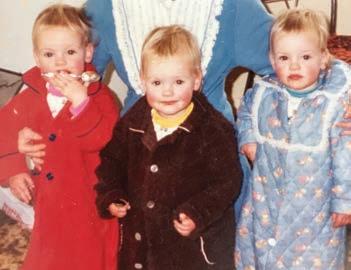
destined to be my dad. He is the kindest, steadiest man and actually taught us at Sunday school when my mum first found Jesus!
“Because of Jesus and what he’s done, there’s nothing that can’t be redeemed, healed, saved or restored.”
Scan here for more stories of hope.
13 M y STOR y
Mia and her daughter visit the grave of Salvation Army founders, Catherine and William Booth.
4 M Ay 2024
Mia, centre, and her sisters as toddlers.
Potato casserole Have a laugh

Ingredients
8 medium potatoes, ¼ cup butter, 1 can cream of chicken soup, 250ml sour cream, ½ cup grated cheese, 6 slices bacon, green salad (optional)
Method
• Peel and slice potatoes.
• Melt butter.
• Add soup and sour cream and mix well.
• Add potatoes, cheese and bacon.
• Toss lightly to mix, then place in casserole dish.
• Bake for 45 minutes at 180°C.
• Serve with a fresh green salad if desired.
I buy every comic book I see. My friends say I have lots of issues.
Snoopy writes a Batman comic book. He is the Dark and Stormy Knight.
I can’t read Charlie Brown comics anymore. Turns out I’m allergic to peanuts.
My life is like an over-produced comic book series. It’s just one issue after another and the plot doesn’t seem to be going anywhere.
Signing In
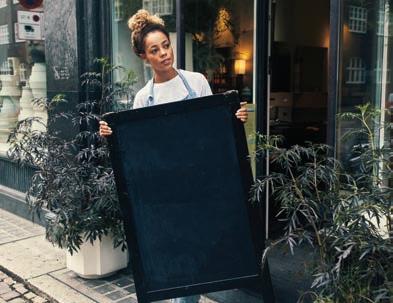
NOT ALL WHO WANDER ARE LOST. MOST ARE JUST LOOKING FOR COFFEE.
SALVOS MAGAZINE TASTE OF LIFE
Fill in the grid so that every row, every column and every 3x3 box contains the digits 1 to 9.

Quick quiz
1. Marie Curie and her daughter Irene-Joliot Curie both won Nobel prizes in which field?
2. Who is the mother of Carrie Fisher?
3. Who was Jamie Lee Curtis’ mother and which film was she most famous for?
4. Who is the daughter of Judy Garland?
On which page of this week’s Salvos Magazine is Tum-Tum hiding?

“Memorise his laws and tell them to your children.”
chapter 6, verses 6-7 Contemporary English Version
Tum-Tum: is hiding in the background on page 5.
5. Melanie Griffith’s mother was terrorised by winged creatures in which horror movie?
Laughter is an instinctive behaviour, produced and recognised by people of all cultures.
Most laughter is not about humour, it’s about relationships between people. We are 30 times more likely to laugh in a social situation than when we are alone.
Laughter usually follows comments in conversation rather than intentional jokes.
Laughter tends to occur in short bursts of vowellike sounds such as: ‘ha-ha’, ‘ho-ho’ or ‘he-he’, which are repeated every fifth of a second.
15
TAKE FIVE
Quiz :answers 1. Radioactivity 2. Debbie Reynolds
3. Janet Leigh in Psycho 4. Liza Minnelli 5. The Birds
(starring Tippi Hedren)
Sudoku Puzzle#1 96812 84 73658 8 64 5721 29 781 2
Bible byte
Solutions #1Puzzle 963458712 582719364 471326958 218643579 649571283 357982146 825194637 796835421 134267895 4 M Ay 2024
Deuteronomy
